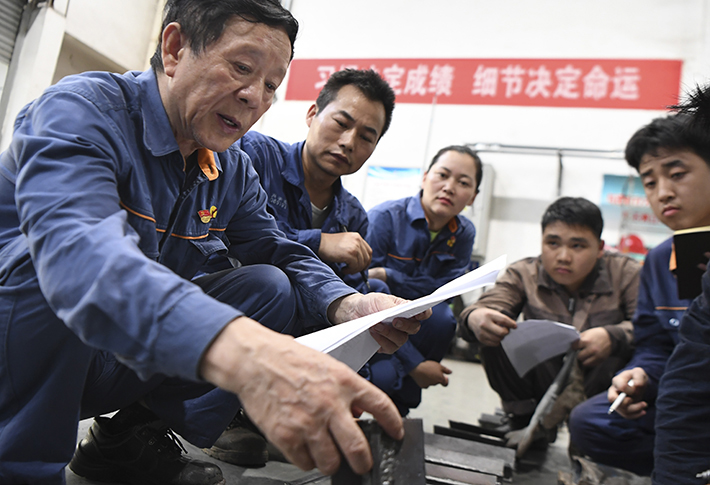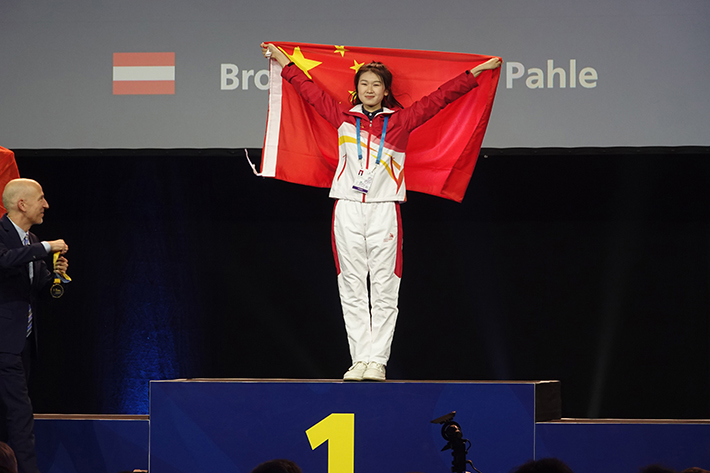|
||||||||||
| Home Nation World Business Opinion Lifestyle ChinAfrica Multimedia Columnists Documents Special Reports |
|
||||||||||
| Home Nation World Business Opinion Lifestyle ChinAfrica Multimedia Columnists Documents Special Reports |
| ChinAfrica |
| Creating Great Craftsmen |
| Vocational education produces highly skilled workers |
| By Ge Lijun 丨VOL. 15 May 2023 ·2023-04-19 |

Master craftsman Ai Aiguo (left) teaches his apprentices how to weld at a vocational school in Xiangtan, Hunan Province, on 17 June 2021
At 20, Jiang Yuhe is the youngest teacher at Henan Chemical Technician College, where she was a student. She was able to find her ideal job because of her success at an international skills competition.
The contest involved dropping 0.01 ml of solution into a bottle. Even a slight tremor of the hand could ruin the task. To prepare for this, she did the same exercise tens of thousands of times and practised 14-15 hours a day. On 27 November 2022, she won the gold medal for Chemical Laboratory Technology at the WorldSkills Competition 2022 Special Edition held in in Salzburg, Austria, the first gold medal in this category for China.
The case of Jiang shows the high priority China attaches to the training of technical talents. The government has made a number of significant efforts, ranging from speeding up the development of modern vocational education to large-scale vocational training and the active organisation of vocational skills competitions. A good atmosphere is therefore being created to nurture many excellent craftspeople.
As the world’s biggest manufacturing country, China depends on the sustainable and healthy growth of the manufacturing sector and its smooth industrial transition and upgrading. Whether in the traditional or modern industry, skilled workers with a spirit of innovation and craftsmanship have long been the backbone of China’s industrial development.
Unremitting efforts
Born in 1977 to an ordinary family in Liuzhou, Guangxi Zhuang Autonomous Region, Zheng Zhiming joined Guangxi Auto in 1997 after graduating from a vocational school. For 26 years, he left home early and came back late every day, practising his skills on the production line and engaging in various tasks such as grinding, filing, tracing and drilling.
Zheng also has the heavy sense of responsibility of organising and leading the team to solve automotive manufacturing problems at the group, national and even global level. Five years ago, automated welding production of rear axle shells was still difficult in China. Zheng took the initiative to lead his team to deal with it. He ended up creating a manufacturing line with numerous positioning techniques and process integration.
The production line, which is compatible with three distinct products, reached an 80-percent automation level, saving 300,000 yuan ($43,624) in labour expenses per year and boosting productivity by approximately 12 percent.
Zheng has always been devoted to the transfer of his skills to the new generation. In 2014, the Zheng Zhiming National Grandmaster Craftsman Workshop was launched. While consistently cultivating talents, he has enthusiastically passed on his methods and expertise to his trainees. The workshop has taught approximately 200 high-calibre technicians.
Grandmaster craftsmen like Zheng are working in many disciplines such as planning, design, construction, operation and maintenance, thereby contributing to the construction of Chinese manufacturing structures and the high-quality growth of the Chinese economy.
The report to the 20th National Congress of the Communist Party of China held in October 2022 noted that cultivating a large workforce of high-quality talent who have both integrity and professional competence is of critical importance to the long-term development of China and the Chinese nation. It called for measures to improve the strategic distribution of human resources and cultivate talented people in all fields, so as to create a large, well-structured, and high-quality workforce.

Jiang Yuhe wins the gold medal for Chemical Laboratory Technology at the WorldSkills Competition 2022 Special Edition held in Salzburg, Austria, on 27 November 2022
Professional training
According to Li Chengxia, a visiting professor at the Changzhou Vocational Institute of Textile and Garment, by the end of 2022, China had more than 200 million skilled workers, including more than 60 million highly skilled personnel. Having grown up in a sewing workshop, Li has long been familiar with production. “From the companies I have surveyed, I can say that there is still a great shortage of highly skilled people,” she said, adding that they are essential to support China’s manufacturing, design and construction.
“The strengthening of vocational education has become an urgent necessity,” said Wan Shiqiang, dean of the School of Life Sciences at Hebei University. According to him, scientific and technological talents include those in basic scientific research and those in technical application; the former, the source and foundation of innovation, are cultivated by universities and research institutes, while the latter, the key to the transformation and application of the results, are trained by vocational and technical schools. The two complement each other, collectively encompassing the elements of a strong science and technology.
“Based on research, I proposed to set up a training system with the participation of the government, enterprises and society,” Liu Jiajun, a master craftsman and employee of Beijing Power Equipment Group, told ChinAfrica. He acquired vocational education in the 1980s, when he graduated from the riveting class at a Beijing vocational school. As an employee of any kind, he has been working on the frontline of production for about 40 years. At work, he constantly pushes his teammates to be creative and to achieve continuous development. “Technological innovation demands talents. So I spend a lot of time in training.”
According to Yu Jiadong, vice minister of human resources and social security, training, implementation and evaluation constitute essential processes for vocational education. The next phase is to present additional examples of excellent master craftsmen, so that they might become a learning model for the majority of employees, particularly young people.
Yu gave recommendations during a recent sharing of experiences with artisans and professionals. Large-scale vocational training should be concentrated in essential sectors and clusters, as well as in regions with vital expertise shortages. Companies should be encouraged to play a full role in allowing talented individuals to create and innovate on the production line, and support their career development and promotion. “We must also keep working to improve the system of vocational skills competitions. Through competitions, many great talented people will be encouraged to stand out and thrive,” he said.
|
||||||||||||
| About Us | Contact Us | Advertise with Us | Subscribe |
| Copyright Beijing Review All rights reserved 京ICP备08005356号-5 京公网安备110102005860号 |